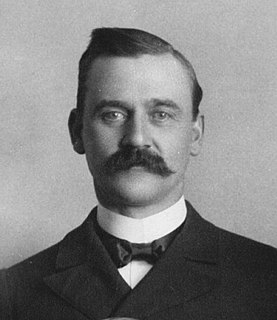A Quote by Clarence Darrow
Some false representations contravene the law; some do not. The law does not pretend to punish everything that is dishonest. That would seriously interfere with business, and, besides, could not be done. The line between honesty and dishonesty is a narrow, shifting one and usually lets those get by that are the most subtle and already have more than they can use.
Related Quotes
Some false representations contravene the law; some do not. ... The sensibilities of no two men are the same. Some would refuse to sell property without carefully explaining all about its merits and defects, and putting themselves in the purchasers' place and inquiring if he himself would buy under the circumstances. But such men never would be prosperous merchants.
God help us, ma'am! Do you see what we saw? We saw that we'd been given a law to live by, a moral law, they called it, which punished those who observed it - for observing it. The more you tried to live up to it, the more you suffered; the more you cheated it, the bigger reward you got. Your honesty was like a tool left at the mercy of the next man's dishonesty. The honest ones paid, the dishonest collected. The honest lost, the dishonest won. How long could men stay good under this sort of a law of goodness?
Those guys are doing the Koch Brothers bidding and are against all the evidence of the rational mind, saying global warming does not exit. They are contemptible human beings. I wish there were a law you could punish them with. I don’t think there is a law that you can punish those politicians under.
We make a big mistake when we conclude that the law is the answer to bad behavior. In fact, the law alone stirs up more of such behavior. People get worse, not better, when you lay down the law. To be sure, the Spirit does use both God's law and God's gospel in our sanctification. But the law and the gospel do very different things.
In Romans 7, St. Paul says, "The law is spiritual." What does that mean? If the law were physical, then it could be satisfied by works, but since it is spiritual, no one can satisfy it unless everything he does springs from the depths of the heart. But no one can give such a heart except the Spirit of God, who makes the person be like the law, so that he actually conceives a heartfelt longing for the law and henceforward does everything, not through fear or coercion, but from a free heart.
Ascension seemed at such times a natural law. If one added to it a law of completion - that everything must finally be made comprehensible - then some general rescue of the sort I imagined my aunt to have undertaken would be inevitable. For why do our thoughts turn to some gesture of a hand, the fall of a sleeve, some corner of a room on a particular anonymous afternoon, even when we are asleep, and even when we are so old that our thoughts have abandoned other business? What are all these fragments for , if not to be knit up finally?
In war, in some sense, lies the very genius of law. It is law creative and active; it is the first principle of the law. What is human warfare but just this, - an effort to make the laws of God and nature take sides with one party. Men make an arbitrary code, and, because it is not right, they try to make it prevail by might. The moral law does not want any champion. Its asserters do not go to war. It was never infringed with impunity. It is inconsistent to decry war and maintain law, for if there were no need of war there would be no need of law.
The health-care law, irrespective of how people feel about the aims of it - and obviously I don't agree with Obamacare - but the worry that some businesses have about how the law will impact their bottom line has made people more apprehensive about expanding and growing their business in the 21st century.
The study of law can be disappointing at times, a matter of applying narrow rules and arcane procedure to an uncooperative reality; a sort of glorified accounting that serves to regulate the affairs of those who have power--and that all too often seeks to explain, to those who do not, the ultimate wisdom and justness of their condition. But that's not all the law is. The law is also memory; the law also records a long-running conversation, a nation arguing with its conscience.
On the Continent, every attempt to substitute a lighter punishment for death was fiercely denounced as a direct violation of the Divine law. Indeed, some persons went so far as to question the lawfulness of strangling the witch before she was burnt. Her crime, they said, was treason against the Almighty, and therefore to punish it by any but the most agonizing deaths was an act of disrespect to Him. Besides, the penalty in the Levitical code was stoning, and stoning had been pronounced by the Jewish theologians to be a still more painful death than the stake.
The First and Fourteenth Amendments say that Congress and the States shall make "no law" which abridges freedom of speech or of the press. In order to sanction a system of censorship I would have to say that "no law" does not mean what it says, that "no law" is qualified to mean "some" laws. I cannot take this step.

































